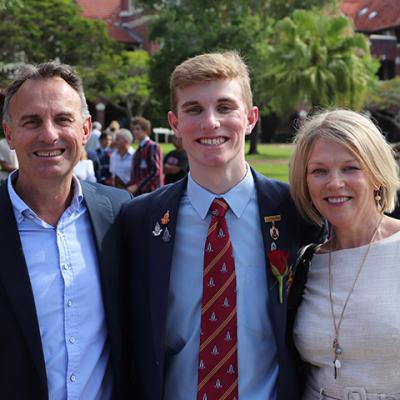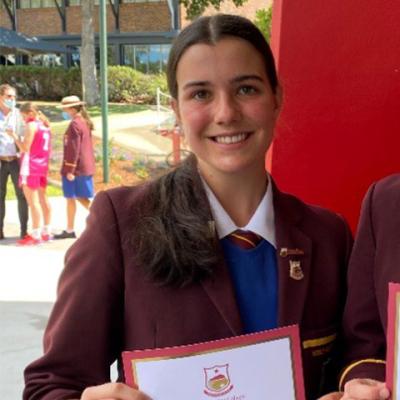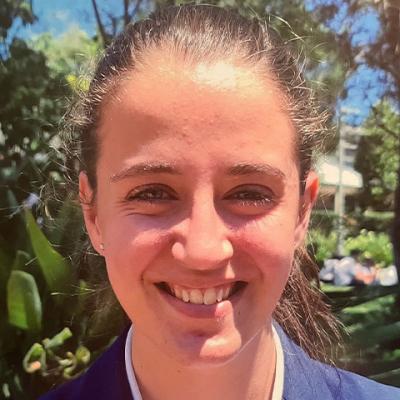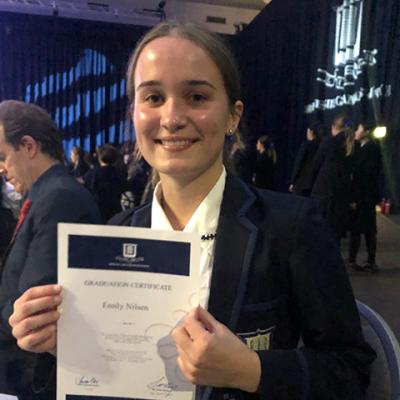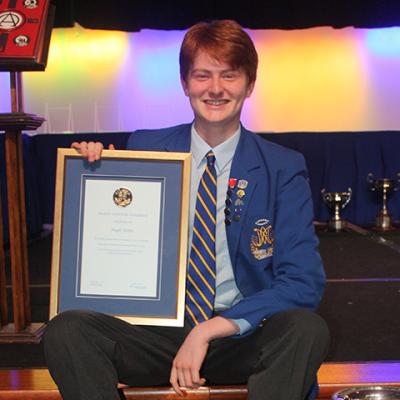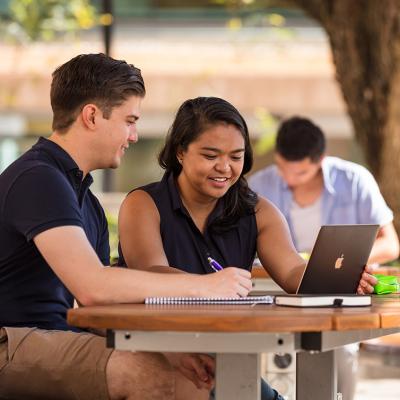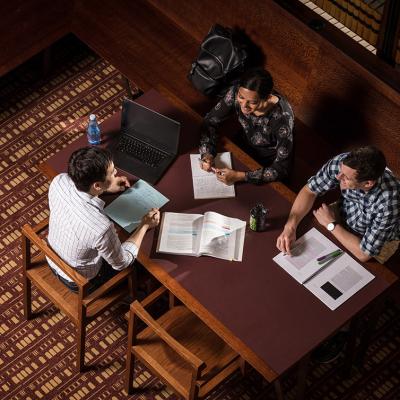Want to finish high school in a blaze of glory? Worried that you don’t know how to achieve a high ATAR? We got the top tips from 12 students who have been there, done that – and they’ve got the 99+ ATARs to prove it.
So, you’ve made it. The last lap. The final boss. Year 12.
You’ve worked and studied for over a decade. Now it’s time for all your efforts to culminate and propel you into the next chapter of your life. And that chapter starts – hopefully – with a high ATAR that gets you into your preferred university program.
Year 12 is a tough beast, though. You haven’t faced a year of schooling like this before – so some tips on how to get a good ATAR might be just what you need to face the challenges ahead. How hard is it to get a 90 ATAR or above? Well, that depends on how much effort you're willing to put in. Luckily, we’ve got advice from 12 graduates who received a UQ Vice-Chancellor’s Scholarship in 2022 by getting an ATAR of 99.90 or 99.95.
Keep in mind: different things work for different people. These students are just sharing what helped them get a high ATAR – and sometimes they don’t even agree on the best approach!
- Managing your time
- Putting in the effort
- Looking after yourself
- Striking a study/life balance
- Asking for help
- Maintaining your motivation
- Taking good notes
- Believing in yourself
Time management is your friend (seriously)
Caine Day knows this is one of those tips that Year 12 students get sick of hearing over and over. But he also can’t deny that it’s potentially the most vital part of doing well throughout the year.
“I know this is said by basically everyone, but time management is the most powerful tool at your disposal,” he says.
“If you want to get serious about your studies, go out and buy yourself a journal and use it for your scheduling.”
For Caine, approaching time management doesn’t have to be overly complicated to be helpful.
“My personal preference is to keep it simple – you don’t have to know what you’re studying 2 weeks in advance,” he says.
“Set yourself a study goal, and when you get home plan your afternoon by dedicating equal blocks of time to each one of your subjects.”
“Do not deviate from this plan, as you want to study an even amount for each subject. If you are consistent with this, you will maximise the efficiency of your study and achieve the ATAR you desire.”
Lachlan Andrews, who graduated from Sheldon College with a 99.95 ATAR, completely agrees with the value of a having a physical schedule.
“Something that really helped me through Year 12 was to use a time planner to organise when I was studying and when I wasn’t,” says Lachlan.
“This really helped to keep a work-life balance, as I could plan my time between study and other commitments.”
It’s never too early to start
One of the best benefits of good time management is that you’ll naturally get into the habit of finishing assessments and revising your topics early. Both Emma Nipperess and Aditya Neurgaonkar are grateful they started things sooner rather than later throughout Year 12.
“Start assignments early and submit drafts at a high standard so you can get quality feedback from your teachers,” Emma suggests.
“Revisit topics from class that you don’t understand within a week of it being taught, so it doesn’t pile up at the very end.”
Aditya agrees, and he stresses that being proactive with your schoolwork isn’t the same thing as hurrying to get it finished.
“One of the best things I did during Year 12 was to actually start early – but that doesn’t mean you rush through everything just to get it done,” says Aditya.
“Rather, the key is to do small chunks of whatever you are doing (assignments, exam revision, or homework).”
“It sounds simple, but it’s a powerful strategy my teacher taught me. This way, the work didn’t seem daunting and by the time the exams or assignments were a week or two out, I had largely finished my work and I was relaxed.”
Make time management work for you
The same schedule doesn’t work for everyone. Fortunately, you’ve had a few years to work out when you can be the most productive with your schoolwork.
For Zoe Cumming, a Year 12 graduate from Moreton Bay College, this was all about choosing the right time of day to focus on study.
“My study only occurred in the afternoon and evening – morning study simply isn’t for me,” says Zoe.
“My routine consisted of coming home from training and first completing tasks assigned as homework or the work I hadn’t finished in class, and then completing around an hour or more of study for the classes I’d had doubles for during the day.
“I found this is what worked best for me and with my timetable, but study is an area where everyone is different, and finding what works for you as an individual is absolutely crucial to academic success.”
Right time and right place
A good study session doesn’t just need the right time of day to happen – your physical location can also help you get in the zone.
For Vivian Toh, this sometimes meant getting out of the house.
“Sometimes it got difficult to stay focused at home with my bed so close to my study desk, so library study sessions were pretty much the norm after Term 1,” says Vivian.
“Studying by myself or with friends in the library surprisingly worked really well for me, as we were all able to help each other out with concepts we struggled with, and concentrate on our own studies when we needed to.”
“When I got home, I tried to stay away from studying, and usually read a book or rested to recharge.”
The right place also means having the right people around – which usually means a healthy mix of solo study and group sessions with your classmates.
Hugh Torpie, a Year 12 graduate from Marist College Ashgrove, warns that studying with others isn’t always as productive as you want it to be. But he believes you should have free time for hanging with your friends separate from study sessions.
“Group study can be really useful, but it can get derailed very quickly,” he says.
“If you study regularly and effectively, you should have plenty of time for other things outside of exam periods.”
Find your effort sweet spot
You’re not a machine – even if sometimes the syllabus makes you feel like you need to be. If you try to fit in as much time as possible for schoolwork and revision, you’ll eventually find your breaking point – the moment where you realise you’ve bitten off more than you can chew.
This is where finding your effort “sweet spot” comes into play – finding the amount of extra work you can do that improves your grades without sending you off the deep end.
For Ewan Stanich, this meant identifying how much extra work would get him results he was happy with, but not trying so hard that he ran out of steam.
“If you’re looking at how to maximise your ATAR, you need to find your own sweet spot for how much effort you’re going to put in,” says Ewan.
“If you put in too little, you obviously won’t be achieving as highly as you might like; however, if you put in too much, you will burn yourself out – and it’s an uphill battle from there.”
“That being said, you want to be closer to the burnout zone than the lazy zone.”
Zoe agrees that it’s a balancing act throughout the year, but she believes it’s better to get to the end of the year with plenty of petrol left in the tank.
“Finish strong is the advice my teachers gave me and is what I would pass onto anyone whose motivation is dwindling or is nervous for the year ahead,” says Zoe.
“Think of every obstacle you have already overcome and all the effort you have already put in, and remember that this is the final chapter – your chance to make everything that has already passed worthwhile – and give it all you’ve got.”
How many hours should you study to get a 99.95 ATAR?
This also comes down to finding your effort sweet spot, as well as thinking about how well you naturally absorb and retain information learnt at school. A topic could take one person 5 study sessions to fully grasp, while another person might understand the topic after a single afternoon focusing on it.
How many hours of exam practice for a 99 ATAR or above?
The important thing is to maintain a consistent revision schedule throughout the year, so when exam practice rolls around, you're already prepared and have retained all the information you need to know. Your exam practice should solidify your existing knowledge.
As a general guide, here’s how a couple of our scholarship recipients got a 99.95 ATAR:
- “My routine involved doing small study sessions (1 hour) in the morning and evening of weekdays, and then doing longer sessions (3 hours) on the weekends so I could complete practice exams which were more time-consuming.” – Lachlan
- “I was fully committed to my studies, spending at least 3 hours every day (excluding schooltime) studying. When I got home, I would always get out my scheduling book and allocate subjects hour-long blocks, aiming for at least 3 hours of solid, undistracted study.” – Caine
- “I usually tried to prioritise studying and made it the first thing I did after I came back from school. This gave me the opportunity to have some downtime every day and not have to worry about unfinished work.” – Luke
Concentrate on the hard topics
It’s tempting to focus on the areas you’re already acing comfortably. After all, it feels pretty sweet to breeze through revision notes and reaffirm how much you know about your favourite subject.
But if you’re wondering how to get an ATAR above 90, the answer is likely spending more time on the subjects that don’t come so naturally to you. This was an important part of Emma’s approach to Year 12.
“I stayed motivated through the year by limiting my study to things that I didn’t understand in class to ensure I didn’t get burnt out,” says Emma.
“If studies got tough, I would take a break and come back to it later.”
Once your subjects all feel relatively level, you can start dividing your study timeslots more evenly between them.
Don’t forget to look after yourself
While you’re juggling assessments and rewriting essays, don’t lose sight of your physical health and mental wellbeing. An essential step to get a good ATAR is to be in a positive headspace during assessments and exams.
Here are some lifestyle tips on how to achieve a high ATAR from our scholarship recipients.
Find ways to relieve stress and maintain your study/life balance
Keeping a balance between study and other parts of life was a common theme among our high-ATAR achievers. For some, it’s as simple as keeping specific days free from study. For others, it’s a little more complicated.
Here are some of their thoughts on maintaining healthy boundaries between school and other activities.
Never hesitate to ask for help
There will come times during Year 12 – probably many times – when you don’t know the answer or feel like you’re not making progress alone. This is when your teachers, peers and support network are most important.
For half of our high-ATAR achievers, knowing when to ask questions was one of the first pieces of advice that came to mind.
“Pay attention in class and ask lots of questions,” advises Emma.
Emily Nilsen agrees – speaking with teachers is part of her #1 tip: be resourceful.
“Talk to teachers about any questions you have throughout the term, always complete practice exams (under timed conditions), and read over provided examples,” she says.
Caine supports this advice too.
“Use your teachers as best you can,” he says.
“Year 12 is different. Your teachers are trying to get you the best marks you can possibly get.”
“Listen to their every word. If they say to study a specific topic, do it. It may just appear in one of your internal assessments.”
But it’s not just teachers who can help you on your quest to get a high ATAR. Don’t forget that your friends and family are an important support network during tough times. This was essential to remember for Vivian and Luke in particular.
“Ask loads of questions,” says Vivian.
“Listening to your teachers or even your friends provide advice can really help whenever you need any clarification or a new perspective on your work.”
Luke believes your classmates should be there to help you get a good ATAR, not necessarily to compete with you.
“My number 1 tip would be to really use the resources around you,” he says.
“If you don’t know something, find someone who does – helping each other is the best way to succeed in Year 12.”
You can ask for emotional support too, not just academic support
Don’t be shy to seek help for your mental wellbeing during Year 12. People are more understanding than you might realise about how difficult this year is – most of us have been through it too! Even when you’re feeling calm and confident, keep in mind who you’ll turn to if things escalate and you feel like you’re struggling under the pressure. Remember these people are here for you, so lean on them when you need to.
Caine, for example, doesn’t think he could’ve achieved his high ATAR without the support of his friend group.
“I believe my mates were my largest support in my senior year – they were always rooting for me and would be genuinely concerned about how I was doing during exam periods and intensive assessment periods,” he says.
“Whenever I had lost my drive, it seemed as though my friends would appear at the perfect time and push me to do my best despite not always wanting to.”
“They were a massive boost. I don’t think they’ve realised the large impact they had on my results, and I would like to thank them for that.”
When we asked these students who they’d like thank for supporting them on their high-ATAR journey, parents, friends and teachers were universally mentioned. Special shout-outs to Mr Haynes (from Aditya), Mr O’Donohue and Mr Blaney (from Emma), and Ms McCarthy (from Ewan).
How about some friendly competition?
For some friend groups, “supporting” each other can sometimes involve a little bit of casual rivalry. The quest to beat the best was one thing that encouraged Ewan to keep improving in his subjects.
“Usually, in each subject I took, there would be someone who was better than me and knew more than I did,” says Ewan.
“I would always be motivated to try to get to the level they were on, as this would help me improve my own performance.”
“These people were my friends, and who doesn’t like getting an answer right over that one friend who seems to know everything?”
For others like Zoe, however, concentrating on your own results is more helpful than competing with classmates.
“Focus on doing better than you did yesterday, as comparison is not only the thief of joy but the thief of success,” she says.
“Trying to do better than someone else is a fruitless endeavour. Instead, work on improving in the areas that have let you down in the past – whether it be your cohesive devices in English or trigonometry in maths – to find those few extra marks which will make all the difference.”
Whether you’re better off taking Ewan’s path or Zoe’s ultimately comes down to what motivates you more.
- Does the idea of competing against your friends push you to do your best?
- Or do you get a stronger rush out of improving your results compared to last week?
Clearly, either approach can help you achieve a high ATAR. You may even like to try a combination of both.
How many people get 99.95 ATAR?
In 2025, just 37 students received an ATAR of 99.95, out of the 30,167 Queensland students who received an ATAR in total.
Identify your motivations, then keep them fresh
All the students we spoke with had different things inspiring them to do their best in Year 12. But they all agreed that keeping that motivation in mind was important during tough times and challenging exam periods.
You might have several motivations for wanting to work out how to get a high ATAR. Here are some that came up in our chats, along with some tips on how you can use them to stay focused on your studies.
Top tip: represent your goals physically
Zoe and Caine both have great examples of how they’ve used a practical item to constantly keep their motivation fresh.
“Sometimes I needed physical reminders to stay motivated,” says Zoe.
“So I taped an engineering information card to my desk to remind myself what I was striving towards.”
For Caine, the place for his motivation was obvious – the study schedule he looked at every day.
“I would keep these goals in the front cover of my scheduling book so that I was constantly reminded what all the study and effort was for,” he says.
Whether it’s a screenshot of a scholarship you want, a collage of your dream job, or a photo of someone who will be proud of your high ATAR, you too could consider placing a physical representation of your goal in your study space at home, your locker at school, or somewhere else you’ll glimpse it regularly.
Take good notes – and revise them well
Doing well in exams is a whole topic by itself, but you better believe notetaking and revision are crucial for getting a high ATAR. Many high achievers, such as David, recommend revising your class notes sooner rather than later.
“My study routine was to always revise as soon as I learn something, to try to put information into my long-term memory,” says David.
Having a prompt revision routine was important for Emily, too.
“At the end of each week or fortnight, I found it was helpful to revise what I had learnt in each subject, so it would be easy to catch up with any issues or questions before they built up too much,” she says.
“In terms of the actual revision, I liked to write the subject matter out in short summaries for each unit in my own words, and complete as many practice questions as I could when I got closer to exam periods.”
Paraphrasing short summaries works well for many students like Emily, but Ewan points out that everyone is different – the study methods that work for your classmates might not be the best fit for you.
“It’s important to understand how you learn, specifically with the goal of reteaching yourself some of the content in months to come,” he says.
“It’s like leaving breadcrumbs in your brain that lead to your forgotten info.”
Of course, revising your notes only helps if your notes are good. Hugh suggests organising your notes around the syllabus and then completing past exams to make sure you’ve covered everything you need to.
“Take thorough notes using each syllabus point and do lots of practice questions and tests,” says Hugh.
“Keep track of which points you need to work on.”
Hugh also recommends using all the material available to you, and he has a great app suggestion too.
“Make sure you understand the new ideas covered in class by using any resources at your disposal (textbooks, syllabus, YouTube, PowerPoints) to write it thoroughly in your own words,” he says.
“Notion is a great note-taking platform which I would recommend using for just a short time each day to write notes on any new syllabus points covered in your subjects.”
Final tip: believe in yourself!
We hope all this advice has you feeling a little more confident with your studies. But, just in case, here are a few final inspirational words from our scholarship recipients.
- “Year 12 is really about putting everything you learnt throughout your school life in action. As long as you commit to good habits in Year 12, it will be a really great year for you.” – Luke
- “If you put in the work and stay true to what you want out of your year, the stress will lessen as you gain more confidence in your abilities.” – Lachlan
- “Even though you may not believe it, you’re extremely prepared for the upcoming year. You have had years of practice for the types of assessment you will have, and your teachers – who have experience with the system – will be there with you every step of the way. The most important thing is to be confident in your abilities and to not give up!” – Emily
Looking for more information about ATARs and how they work? Read our quick guide on ATARs.





